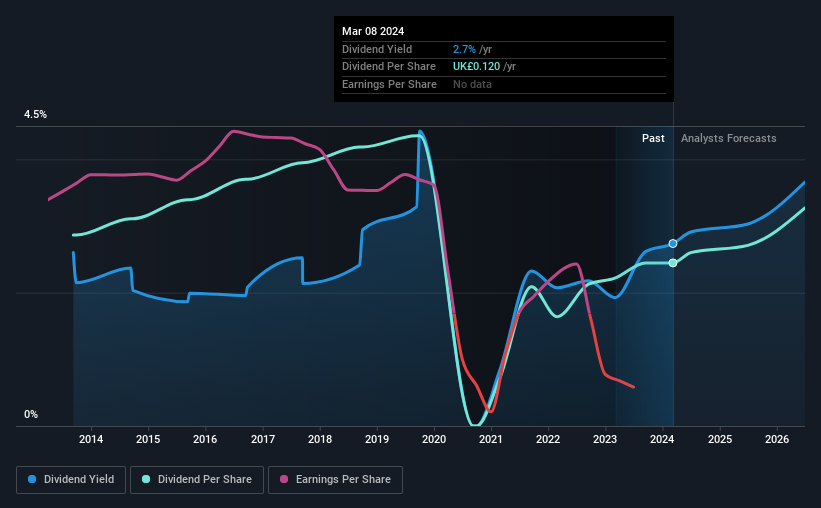Don't Buy Ricardo plc (LON:RCDO) For Its Next Dividend Without Doing These Checks
Regular readers will know that we love our dividends at Simply Wall St, which is why it's exciting to see Ricardo plc (LON:RCDO) is about to trade ex-dividend in the next four days. The ex-dividend date is one business day before a company's record date, which is the date on which the company determines which shareholders are entitled to receive a dividend. The ex-dividend date is an important date to be aware of as any purchase of the stock made on or after this date might mean a late settlement that doesn't show on the record date. Accordingly, Ricardo investors that purchase the stock on or after the 14th of March will not receive the dividend, which will be paid on the 11th of April.
The company's next dividend payment will be UK£0.038 per share, and in the last 12 months, the company paid a total of UK£0.12 per share. Based on the last year's worth of payments, Ricardo has a trailing yield of 2.7% on the current stock price of UK£4.37. Dividends are an important source of income to many shareholders, but the health of the business is crucial to maintaining those dividends. As a result, readers should always check whether Ricardo has been able to grow its dividends, or if the dividend might be cut.
See our latest analysis for Ricardo
Dividends are usually paid out of company profits, so if a company pays out more than it earned then its dividend is usually at greater risk of being cut. Ricardo lost money last year, so the fact that it's paying a dividend is certainly disconcerting. There might be a good reason for this, but we'd want to look into it further before getting comfortable. Considering the lack of profitability, we also need to check if the company generated enough cash flow to cover the dividend payment. If cash earnings don't cover the dividend, the company would have to pay dividends out of cash in the bank, or by borrowing money, neither of which is long-term sustainable. The company paid out 100% of its free cash flow over the last year, which we think is outside the ideal range for most businesses. Cash flows are usually much more volatile than earnings, so this could be a temporary effect - but we'd generally want to look more closely here.
Click here to see the company's payout ratio, plus analyst estimates of its future dividends.
Have Earnings And Dividends Been Growing?
Businesses with shrinking earnings are tricky from a dividend perspective. If earnings decline and the company is forced to cut its dividend, investors could watch the value of their investment go up in smoke. Ricardo was unprofitable last year and, unfortunately, the general trend suggests its earnings have been in decline over the last five years, making us wonder if the dividend is sustainable at all.
The main way most investors will assess a company's dividend prospects is by checking the historical rate of dividend growth. Ricardo's dividend payments per share have declined at 1.6% per year on average over the past 10 years, which is uninspiring.
Get our latest analysis on Ricardo's balance sheet health here.
Final Takeaway
Is Ricardo an attractive dividend stock, or better left on the shelf? We're a bit uncomfortable with it paying a dividend while being loss-making, especially given that the dividend was not well covered by free cash flow. It's not an attractive combination from a dividend perspective, and we're inclined to pass on this one for the time being.
So if you're still interested in Ricardo despite it's poor dividend qualities, you should be well informed on some of the risks facing this stock. Every company has risks, and we've spotted 1 warning sign for Ricardo you should know about.
Generally, we wouldn't recommend just buying the first dividend stock you see. Here's a curated list of interesting stocks that are strong dividend payers.
Have feedback on this article? Concerned about the content? Get in touch with us directly. Alternatively, email editorial-team (at) simplywallst.com.
This article by Simply Wall St is general in nature. We provide commentary based on historical data and analyst forecasts only using an unbiased methodology and our articles are not intended to be financial advice. It does not constitute a recommendation to buy or sell any stock, and does not take account of your objectives, or your financial situation. We aim to bring you long-term focused analysis driven by fundamental data. Note that our analysis may not factor in the latest price-sensitive company announcements or qualitative material. Simply Wall St has no position in any stocks mentioned.

